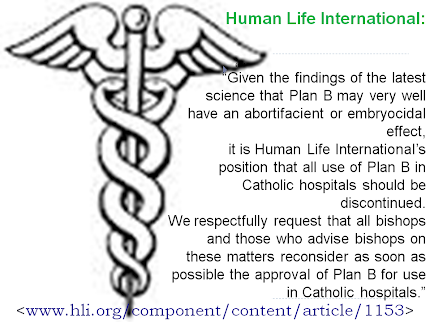Our Sunday Visitor Newsweekly,
200 Noll Plaza
Huntington, IN 46750
osvletters@osv.com
Dear Ms. Crowe,
Back in February, you announced the updating of the Vatican's original Charter for Health Care Workers (Vatican Radio listed those "new references of the Magisterium, after 1994, that appear in the [updated] Charter."). Thanks to the translation work of the National Catholic Bioethics Center, hard copies of the New Charter for Health Care Workers are now available in English. It is simply the best compendium of Catholic medical ethics / bioethics, to be supplemented with relevant medical information and original magisterial teaching.
Like the original, the New Charter consists of sections on procreating, living, and dying, between its introduction and conclusion. In its introduction, it reminds us that the vocation of health care is to be greatly honored. All that it then goes on to proclaim about human procreation rests on the truth, that “11….The inseparable bond between conjugal love and human generation, imprinted on the nature of the human person, is a law by which everyone must be guided and to which everyone is held.” While the Church clearly prohibits embryo "transfers," some suggested the possibility of an exception for "embryo adoption" (aka, "snowflake adoption") was not settled with Dignitas Personae (n. 18-19) of 2008. I find nothing in the New Charter to sustain the idea of an exception.
The
section on "Living" is the Charter's largest, covering a vast
array of areas. Like Dignitas Personae (n. 23), the New Charter offers NO guidelines for any supposed "moral" use
of either "interceptives" or "contragestatives." It has long struck me as disingenuous to deny or downplay the very, very real risk of causing an abortion by emergency [so-called] contraception in Catholic hospital emergency rooms (cf.,
- Rebecca Peck, MD, Walter Rella, MD, Julio Tudelo, PharmD, PhD, Justo Aznar, PhD, and Bruno Moznegga, MD, Does levonorgestrel emergency contraceptive have a post-fertilization effect? A review of its mechanism of action, Linacre Quarterly, April 2016;
- Rebecca Peck, MD, Chris Kahlenborn, MD and Walter B Severs, PhD, FCP, Mechanism of action of levonorgestrel emergency contraception, Linacre Quarterly, February 2015;
- Fr. Juan Vélez, MD and Rebecca Peck, MD, The Postovulatory Mechanism of Action of Plan B, NCBC Quarterly, Winter 2013)
While
footnote #167 might seem to infer a favorable judgment on the use of
Induced Pluripotent Stem Cells, Dignitas Personae (n. 30) appears
to preclude their use. Dr. Diane Irving has told us that "'Some iPS cell
are potentially
embryos'....Given the ability of cells to be reverted to the embryonic
stage, she said, 'any human cell can be used for reproductive purposes,'
so pro-life people must start making very careful distinctions about
what type of cell is being created and used and the methods used to
obtain them" (LifeSiteNews, 4/23/13).
While some have acted as though the
Church has already issued a definitive judgement on brain death criteria, Dr. Peter Colosi (Our Sunday Visitor Newsweekly, 8/8/12) reminds us that "The
medical studies of Dr. Alan
Shewmon of UCLA Medical School are quite convincing indications that
brain dead people are not dead, or at the very least that we do not have
moral certainty that they are." The updated Charter
includes this 2008 cautious quote from Pope Benedict XVI: “In an area
such as this, in fact, there cannot be the slightest suspicion of
arbitration and where certainty has not been attained the principle of
precaution must prevail. This is why it is useful to promote research
and interdisciplinary reflection to place public opinion before the most
transparent truth on the anthropological, social, ethical and juridical
implications of the practice of transplantation."
The Charter's section on "Dying" also speaks of "Civil laws and conscientious objection." Personally, I wish that the Charter reprinted - in its entirety - a 6/9/05 letter from the president of the Pontifical Academy for Life, in which he reviewed "The principle of licit cooperation in evil."
The Charter's section on "Dying" also speaks of "Civil laws and conscientious objection." Personally, I wish that the Charter reprinted - in its entirety - a 6/9/05 letter from the president of the Pontifical Academy for Life, in which he reviewed "The principle of licit cooperation in evil."
Thank you,
























